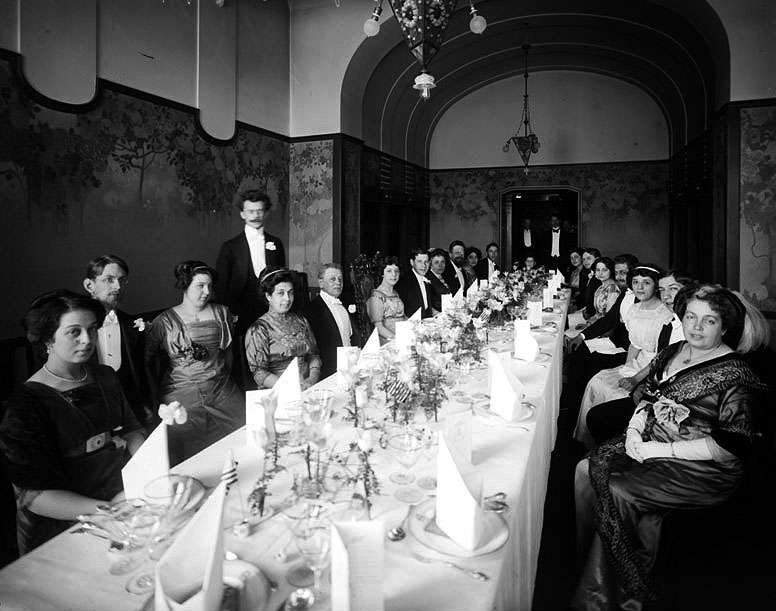In a recent bloggingheads conversation Michelle Goldberg made this remark to Rebecca Traister regarding Sarah Palin:
This is an interesting question and one I wish more on the left were interesting in taking on. A commenter wrote:
She's young enough and grew up in a way to have basically been raised in a society that didn't buy into a lot of traditional sex roles and which could admire plenty of what people like Steinem did or have said. So her feeling this way but having little knowledge of actually feminism as a movement is hardly surprising.
I was glad to see someone brought it up in the threads... the idea that the right has a knack for being on the wrong side of history and then developing a sort of amnesia in which maybe they were not only always on the right side, but at least, well, they are now and
it's the left who's making the problem worse by always bringing it up!
Just recently I was debating someone who was seemingly convinced that racism has always been a bipartisan affair, evidenced by the southern democrats. I think a lot of conservatives have this sort of whitewashed view of history, probably culminating in the idea that because Lincoln, a Republican, freed the slaves conservatives are the original civil rights pioneers.
This is absurd for a variety of reasons. The two parties have stood for very different things over the years. (I've always been baffled by this to a degree - if anyone can point me to some good writing on race and the parties, I'd be grateful!) But I think the more serious way to follow race is through the prism of left and right, the concept of traditional power structures and the amelioration of imbalances (often via government).
So in this sense, the right has always been about favoring status-quo hierarchies, which happen to have been white, male, Protestant, heterosexual, etc. (these labels weren't pulled out of some arbitrary liberal hat). And the left has been about challenging them.
This is why my mother, as a hippie college student in the late 60's, traveled into the south to demonstrate solidarity with the struggle for civil rights. She knew that it was also about something larger, which was also why she was wearing goofy clothes, using contraception, experimenting with drugs, and basically rebelling against the established social order of the day.
That wasn't happening on the right. More generally, that
doesn't happen on the right. It has become pat for conservatives to accuse liberals of group-think - the real conformists. But while ideological captivity will always be found any movement, it's just silly to try and argue that the left isn't about subverting the dominant paradigm (remember that bumper-sticker?), and the right about hewing to it.
None of which gets at how conservatives are able to make the leap from active protesters of civil rights to amnesiac defenders of it. The commenter is I think correct in identifying how defending tradition can lead one to embrace what has changed when a certain point of momentum has been reached. But it still doesn't go far enough in explaining how this mindset can happen.
The commenter's example of Palin's relative youth providing her with a sort of innate privilege of feminism is good, and all she would need is to be ignorant of the fact that she owes everything she is to the left's insistence on challenging patriarchy.
But this isn't just Palin. Modern conservatism as a whole seems to be completely ignorant of what the left has achieved for the concept of civil rights,
and that the right was fighting them the whole way. Everyone can't simply be that ignorant. There must be deeper, structural reasons for this inability to deal with the reality of history.
For instance, there have been very few conservatives out there even interested in race, aside from as a reactionary politics in which race is "all in the past" and liberals are the only real problem. But where were the conservative writers in the 50's, 60's, and 70's? Suddenly, in the 80's we get the growth of the angry white male backlash - ala Limbaugh - and suddenly we're all OK and it's the liberals using race to "get votes" with welfare, food stamps, etc.
Yet meanwhile, for decades, the left had been plugging away. Starting with rallies and marches - ala King, they then filled out academia in the 70's and 80's, making a systematic dismantling of race, gender, sexuality, etc. an institution in America (obviously the civil rights movement is much older, but this was breaking into the establishment). Black studies, women studies, etc. all sought to put all of these forms of hatred and oppression under a microscope, seeing them as a cancer upon society and violating the nation's ideals. They wanted to know what actually happened, why it happened, how it happened and how to stop it from ever happening again.
And the discussion continues. Racism, sexism, homophobia, etc. are still alive and thriving. The left believes it has many of the answers, and unfortunately for the right, the blame lies squarely at their feet, in a variety of ways.
The problem is that the right has no response, other than utter denial. Yet it is a "dumb" denial, in the sense that they aren't really sure what the problem is. The pat reaction is to simply accuse liberals of baseless attacks. But this is their only option, because while they know racism and hate are wrong (well, usually. see: gays, immigrants, Muslims), they don't understand the historical nature of hate, and how it works.
This claim would be easy to refute. Just show evidence of conservatives attempting to understand where hate comes from and how it operates. Because the right has never been interested in doing this, and they certainly haven't taken the time to read the liberals who have, they aren't familiar with the basic theory. In academia, everything from psychology, economics, sociology, to neuroscience has weighed in repeatedly, for decades. A broad literature exists that has many of the answers.
But to the modern right, you're either a racist or you aren't. Racism is bad. Not being racist is good. But that's about the beginning and the end of it. Aside from tortured narratives about liberals creating racism among minorities (ugh, that was hard to write), there is essentially zero discussion of the historical context or theoretical foundations - the where, why and how of hate.
No unconscious memes or biases. No cultural patterns or sociological pressures. No economic systems of power. No entrenched classes or power hierarchies. Trying to have a conversation about race with those so ignorant of basic concepts is like talking to someone with their fingers in their ears.















